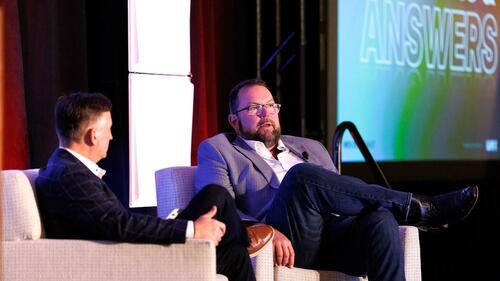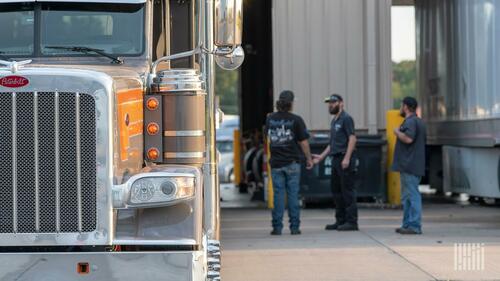“We’re At A Tipping Point” – Trucking Industry Facing “Horrible” Rates, Tariffs, Werner CEO Says
By Noi Mahoney of FreightWaves,
At the WEX OTR Summit, Derek Leathers, chairman and CEO of Werner Enterprises, warned of tight capacity and higher operating costs in the trucking industry.
“We’re at a tipping point,” Leathers told attendees. “Capacity is leaving the market little by little. The industry needs significant rate increases to sustain itself. This isn’t just about survival — it’s about making sure trucking can continue to deliver America’s goods safely and reliably in the years ahead.”
WEX, a global commerce platform that simplifies the business of running a business, held its summit Wednesday through Friday in San Antonio, Texas.
The event brought together over 150 leaders from the over-the-road trucking industry for two days of insight, innovation and collaboration.
With the theme of “The Road Ahead,” this year’s summit features keynotes, and strategic discussions on the trends shaping transportation, including fuel management, fraud protection, payments technology and more.
The second day of the conference featured a keynote address from Leathers, who cited weak rates, new tariffs, driver shortages and cargo theft as key risks — even as nearshoring fuels U.S.–Mexico trade growth.
Leathers, whose company is one of the largest U.S. trucking and logistics providers, noted that freight rates have been challenging in recent years, leaving many small carriers unable to reinvest in equipment or operations.
Omaha-based Werner Enterprises was founded in 1956 and has around 8,000 trucks and over 24,000 trailers. The company provides service across North America.
“What’s going on in the freight environment right now? Obviously, rates have been depressed, and although it is stable, they are stably horrible for the most part over the last several years, well below people’s operating costs in many cases. At a minimum, not a reinvestable rate level,” Leathers said.

With Class 8 truck orders at historic lows and OEMs scaling back production, he predicted it could take years to rebuild manufacturing capacity, leading to higher truck prices “at the time we can least afford for them to be more expensive.”
Tariffs squeeze supply chains
Tariffs were another key focus of his address. Leathers cautioned that only about half of the tariff impact has reached consumers so far, with the rest absorbed by suppliers and retailers — a strain he expects will increasingly filter through the supply chain.
He also raised concerns over new tariffs on trucks made in Mexico, despite USMCA’s trade protections, arguing they will further inflate equipment costs.
“On the truck side, two thirds of all or three fourths of all truck makers actually exist and make their trucks in Mexico. If I had been betting on this stage a year ago, I would have lost that bet because I would have said that USMCA would supersede and that there would be no additional tariffs on trucks from our neighbors. Clearly that is not the case as we stand here today,” Leathers said.
Leathers also highlighted the industry’s growing safety and compliance challenges, including renewed enforcement of English-language proficiency rules for CDL holders and the scrutiny of B-1 visa drivers operating cross-border routes.
Nearshoring strengthens U.S.–Mexico trade
Looking at broader trends, he pointed to nearshoring as a lasting shift that will deepen U.S.–Mexico trade ties. Werner already moves more than 300 cross-border loads daily, a number he expects to grow as U.S. companies boost investment in Mexico.
“Mexico is the only neighboring country or even nearshoring option that actually has good demographics,” Leathers said. “Very few places in the world do and Mexico actually does have as many people coming into the population. as they’re losing from the population and that’s true for the next 10 to 20 years.”
Cargo theft and supply chain security
Beyond the macroeconomic headwinds, Leathers also addressed rising cargo theft, calling it a “terrifying” trend fueled by organized crime. He urged shippers and carriers to strengthen vetting and technology safeguards to protect supply chains.
“Cargo theft has continued to rise. I think when you see a population that feels underdressed, that’s when risky behavior seems to always increase over time,” Leathers said.
“I think this is an area where not having proper vetting of every single man or woman on the road makes a difference. We know factually speaking from the FBI and others, there are in fact many criminal organizations outside the United States that are heavily involved in this work. There are organizations inside the U.S. as well, but the numbers are staggering.”
Trucking leaders say data will drive sustainable freight
Executives from FedEx, J.B. Hunt, and NFI Industries said the trucking industry’s path to sustainability hinges on efficiency and data-driven reporting, as customers and regulators press for greater transparency.
Speaking at the “Driving Green with Data: Executive Insights on Sustainability and Reporting” panel on Thursday, FedEx Express executive Mickey Black highlighted the company’s pledge to reach carbon neutrality by 2040.
“That commitment gave the entire organization a clear mandate,” Black said.
J.B. Hunt’s Jared Mounce outlined the carrier’s 32% greenhouse gas intensity reduction target by 2034, stressing that intensity goals better reflect efficiency as freight volumes grow.
NFI’s Alexa Branco emphasized the importance of tracking fuel consumption, idling, and emissions intensity to prove ROI and prepare for stricter reporting.
Panelists agreed shippers increasingly require emissions reporting in contracts, some now demanding lane- or package-level detail.
Sarah Booth, director, Sawatch Labs; Alexa Branco, director of sustainability, NFI Industries; Mickey Black, managing director global vehicles and surface fuel, FedEX; Jerrod Mounce, vice-president of energy & sustainability, J.B. Hunt at the WEX OTR Summit in San Antonio, Texas on Thursday.
Tyler Durden
Sun, 10/05/2025 – 18:40ZeroHedge NewsRead More





 R1
R1
 T1
T1


